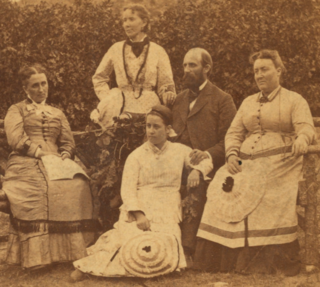Related Research Articles

Polygyny is a form of polygamy entailing the marriage of a man to several women. The term polygyny is from Neoclassical Greek πολυγυνία (polugunía); from Ancient Greek πολύ (polú) 'many', and γυνή (gunḗ) 'woman, wife'.
Polygamy is the practice of marrying multiple spouses. When a man is married to more than one wife at the same time, it is called polygyny. When a woman is married to more than one husband at the same time, it is called polyandry. In sociobiology and zoology, researchers use polygamy in a broad sense to mean any form of multiple mating.

Polygamy was practiced by leaders of the Church of Jesus Christ of Latter-day Saints for more than half of the 19th century, and practiced publicly from 1852 to 1890 by between 20 and 30 percent of Latter-day Saint families.

In a culture where only monogamous relationships are legally recognized, bigamy is the act of entering into a marriage with one person while still legally married to another. A legal or de facto separation of the couple does not alter their marital status as married persons. In the case of a person in the process of divorcing their spouse, that person is taken to be legally married until such time as the divorce becomes final or absolute under the law of the relevant jurisdiction. Bigamy laws do not apply to couples in a de facto or cohabitation relationship, or that enter such relationships when one is legally married. If the prior marriage is for any reason void, the couple is not married, and hence each party is free to marry another without falling foul of the bigamy laws.

Mormon fundamentalism is a belief in the validity of selected fundamental aspects of Mormonism as taught and practiced in the nineteenth century, particularly during the administrations of Joseph Smith, Brigham Young, and John Taylor, the first three presidents of the Church of Jesus Christ of Latter-day Saints. Mormon fundamentalists seek to uphold tenets and practices no longer held by mainstream Mormons. The principle most often associated with Mormon fundamentalism is plural marriage, a form of polygyny first taught in the Latter Day Saint movement by the movement's founder, Smith. A second and closely associated principle is that of the United Order, a form of egalitarian communalism. Mormon fundamentalists believe that these and other principles were wrongly abandoned or changed by the LDS Church in its efforts to become reconciled with mainstream American society. Today, the LDS Church excommunicates any of its members who practice plural marriage or who otherwise closely associate themselves with Mormon fundamentalist practices.
Many laws in the history of the United States have addressed marriage and the rights of married people. Common themes addressed by these laws include polygamy, interracial marriage, divorce, and same-sex marriage.

The 1890 Manifesto is a statement which officially advised against any future plural marriage in the Church of Jesus Christ of Latter-day Saints. Issued by Church President Wilford Woodruff in September 1890, the Manifesto was a response to mounting anti-polygamy pressure from the United States Congress, which by 1890 had disincorporated the church, escheated its assets to the U.S. federal government, and imprisoned many prominent polygamist Mormons. Upon its issuance, the LDS Church in conference accepted Woodruff's Manifesto as "authoritative and binding."

Polygamy in the Church of Jesus Christ of Latter Day Saints, or plural marriage, is generally believed to have originated with the founder of Mormonism, Joseph Smith. According to several of his associates, Smith taught that polygamy was a divine commandment and practiced it personally, by some accounts marrying more than 30 women, some of whom had existing marriages to other men. Evidence for Smith's polygamy is provided by the church's "sealing" records, affidavits, letters, journals, and diaries. However, until his death, Smith and the leading church quorums denied that he preached or practiced polygamy. Smith's son Joseph Smith III, his widow Emma Smith, and the Reorganized Church of Jesus Christ of Latter Day Saints challenged the evidence and taught that Joseph Smith had opposed polygamy. They instead claimed that Brigham Young, the head of the Church of Jesus Christ of Latter-day Saints, introduced plural marriage after Smith's death. In 1852, leaders of the Utah-based LDS Church publicly announced the doctrine of polygamy.
Polygamy is the practice of having more than one spouse at the same time. Specifically, polygyny is the practice of one man taking more than one wife while polyandry is the practice of one woman taking more than one husband. Polygamy is a common marriage pattern in some parts of the world. In North America, polygamy has not been a culturally normative or legally recognized institution since the continent's colonization by Europeans.

Possibly as early as the 1830s, followers of the Latter Day Saint movement, were practicing the doctrine of polygamy or "plural marriage". After the death of church founder Joseph Smith, the doctrine was officially announced in Utah Territory in 1852 by Mormon leader Brigham Young. The practice was attributed posthumously to Smith and it began among Mormons at large, principally in Utah where the Church of Jesus Christ of Latter-day Saints had relocated after the Illinois Mormon War.
Polygamy is "the practice or custom of having more than one wife or husband at the same time." Polygamy has been practiced by many cultures throughout history.

Joseph Smith, the founder of the Latter Day Saint movement, privately taught and practiced polygamy. After Smith's death in 1844, the church he established splintered into several competing groups. Disagreement over Smith's doctrine of "plural marriage" has been among the primary reasons for multiple church schisms.
Like many nations in the Muslim world, polygyny is legal in Bahrain. However, according to the Bahrain Center for Human Rights' write-up on women's rights in Bahrain at the present time, polygamy is only practiced by a minority of Bahraini citizens, though unlike most nations, levels of education and areas of habitation do not play a strong role in statistics composed of citizens practicing polygamy. Between 2010 and 2015, the polygamy rate in Bahrain was 5.16 percent.

Under civil law, Nigeria does not recognize polygamous unions. However, 12 out of the 36 Nigerian states recognize polygamous marriages as being equivalent to monogamous marriages. All twelve states are governed by Sharia law. The states, which are all northern, include the states of Bauchi, Borno, Gombe, Jigawa, Kaduna, Kano, Katsina, Kebbi, Niger, Sokoto, Yobe, and Zamfara which allows for a man to take more than one wife.
Polygamy is illegal in France and has been the center of recent political debates, due to surges of Malian immigrants living polygamously in the country. Due to such, stricter laws have been enforced to stomp out polygamy.
The legal status of polygamy varies widely around the world. Polygyny is legal in 58 out of nearly 200 sovereign states, the vast majority of them being Muslim-majority countries. Some countries that permit polygamy have restrictions, such as requiring the first wife to give her consent.
Polygamy is not legally recognised in Australia. Legally recognised polygamous marriages may not be performed in Australia, and a person who marries another person, knowing that the previous marriage is still subsisting, commits an offence of bigamy under section 94 of the Marriage Act 1961, which carries a maximum penalty of 5 years imprisonment. However, the offence of bigamy only applies to attempts to contract a legally recognised marriage; it does not apply to polygamous marriages where there is no attempt to gain recognition for the marriage under Australian law. Whether or not either or both partners were aware of the previous subsisting marriage, the second marriage is void. Foreign polygamous marriages are not recognized in Australia. However, a foreign marriage that is not polygamous but could potentially become polygamous at a later date under the law of the country where the marriage took place is recognized in Australia while any subsequent polygamous marriage is not. While under Australian law a person can be in at most one legally valid marriage at a time, Australian law does recognise that a person can be in multiple de facto relationships concurrently, and as such entitled to the legal rights extended to members of de facto relationships.
The practice of polygamy has had a long history in Kazakhstan, which officially decriminalized the practice in 1998, being the only Central Asian country to do so. Polygamous marriages are not recognized under the law, but bigamy is not a crime. In practice, polygamy is common in Kazakhstan, and is often seen as a sign of a man's social prestige.
Polygamy is illegal in Ghana, but the restrictions are not heavily enforced. Polygamous marriages are illegal under civil law, though are arguably considered to be legal under customary law. Despite these exceptions, there have been no reports of a legally contracted polygamous marriage in Ghana; and are considered to be "de facto" illegal. An estimated 22% of Ghanaian women live polygamously.
In the Church of Jesus Christ of Latter-day Saints, marriage between a man and a woman is considered to be "ordained of God". Marriage is thought to consist of a covenant between the man, the woman, and God. The church teaches that in addition to civil marriage, which ends at death, a man and woman can enter into a celestial marriage, performed in a temple by priesthood authority, whereby the marriage and parent–child relationships resulting from the marriage will last forever in the afterlife.
References
- ↑ Chaleby, Kutaiba (1985). "Brief Communication". The Journal of Nervous and Mental Disease. 173 (1): 56–8. doi:10.1097/00005053-198501000-00009. PMID 3965613. S2CID 13737031.
- ↑ "Kuwait has 'highest rate of polygamy, cousin marriages'". The New Arab . London, United Kingdom. December 4, 2019. Retrieved September 7, 2023.
- ↑ http://www.kuwaittimes.net/read_news.php?newsid=MjY1ODU5MDgw [ dead link ] I DO, I DO, I DO: Polygamy Today
